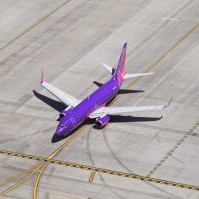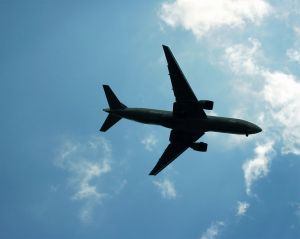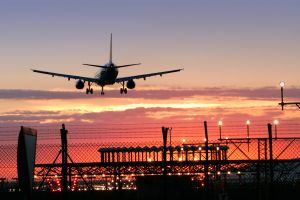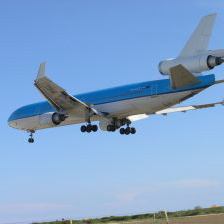The Travel Detective
Aviation Consultant Michael Boyd on NextGen and the Future of Flying
| Entry Text: |  Have you heard of the FAA’s NextGen program? Have you heard of the FAA’s NextGen program?
It’s a complete overhaul of the National Airspace System, in which the FAA is working toward guiding and tracking air traffic. But is it really the next big answer? Peter sat down with aviation consultant Mike Boyd of the Boyd Group to discuss the future of flight delays, and to figure out their own solutions for dealing with tarmac delays. Peter Greenberg: Mike, tell me the truth. Are you trying to tell me delays will be a thing of the future? Mike Boyd: I think so. This NextGen program that the government has to fix our air traffic control system just fell another four years behind. I’m afraid there’s not much coming along to fix that, so we’re going to have to adjust our air transportation system to the air traffic control system. PG: OK, walk me through that. What does that mean?
PG: Well, you’re asking the FAA to do something it’s never done. MB: Right, something intelligent. But again the reality is airlines and organizations shouldn’t be asking Congress to fund this; they should be asking Congress to make sure the FAA gives them a system they need. That’s the fundamental difference. PG: Let’s do some history work here. The FAA has been funded with certain systems like this before and they never implemented them. There are boxes of equipment gone unopened. MB: Oh, absolutely. I have an article on my desk here from 1993 where the FAA comes out and says, “We’re going to have the air traffic control system fixed by 2001 at the latest.” That was the Advanced Automation System, $5 billion, and it’s gone.
MB: Absolutely. Air traffic controllers are using outdated stuff. God bless them, they’re fine people, but they just don’t have the tools to work with. The problem is the FAA is trying to increase the number of airways in the sky with this new program. What you need to do is use all the sky, you don’t need airways. We have that equipment in airplanes; we don’t have it on the ground. PG: Every week there’s another press release that comes across my desk about NextGen. I happen to think the term “NextGen” is a joke because we’re how many “gens” away from that? MB: I call it YesterdayGen. All they did was take a bunch of programs, package it together, reschedule it, call it NextGen, and say it’s on time. I mean it really is a fraud. Unfortunately the airline industry really is happy with it. You’d think if you’re losing $10 billion in extra cost they’d be raising hell. They’re not doing anything except banging on the doors of Congress saying, “We support you.”
MB: No, because an airline says, if 20 flights have to be diverted from New York to Hartford, there may not be a gate to get people off. As a result, they’ll just cancel the flight. They can’t take a risk on breaking the law and getting a $4 million fine. If consumers think that 4 percent of the flights canceled in January is high, it will probably go higher. Any time there’s bad weather, airlines aren’t going to take a chance. The problem is we have a Secretary of Transportation who didn’t think it through before he put that rule in. PG: So you don’t think it’s a good rule? MB: No, it’s a horrible rule because it assumes that airlines do it intentionally, and it assumes that when it happens there is always an option to get someone off an airplane. That’s not always the case, so airlines cannot take a risk on a $4 million fine and they’ll just cancel. PG: I have a whole different philosophy about this. I don’t need your stinking jetway; I just need portable stairs. Once we can get over that mindset that every airplane needs a jetway, we’d stop a lot of the delays and all the extra fuel burn and people just waiting for a jetway. How many times have we been on a plane where you actually know from takeoff that you’re going to be landing early? It happens. So when you land at the airport why can’t you roll up some portable stairs and get everybody off the plane?
MB: If you have the stairs, I agree with that. But when we have a weather situation where you might have literally 20 airplanes divert to Hartford, you’re not going to have 20 sets of stairs. When Denver’s airport gets shut down due to weather and they get sent to Colorado Springs, you’re not going to have stairs. You may not even have enough people on the ground to monitor the people. So it may not be possible to safely get them off.
MB: Absolutely, and there’s an issue there. I just came in from New York into Denver it was 50 minutes early. If you slow the airplane down and get there on time, save a little gas, the consumer will still be happy. Getting in early and then sitting there burning gas waiting for a jetway, nobody benefits from that. PG: And every airline CEO who I have asked the question about getting portable stairs can’t give me an answer. MB: Most of our airports have not been built for that, and many of them don’t have stairways that would accommodate it. And then they have baggage. No, there isn’t a really good answer, you’re right. But when was the last time you really thought an airline cared about you more than they cared about the stupid rules? The rules take priority over the customer and that’s just not right. PG: That’s why I laugh when Delta Air Lines announces it’s sending 11,000 of its ground personal to charm school. What does that mean? They’re going to tell us with a smile that they’re not going to do anything for us? MB: We used to do a lot of airline training, but you can’t just do one day. That doesn’t change a thing. You’ve got to change the environment that they’re in. What they’re doing is sending them to charm school so that they can say “no” better, not so they can say “yes.” You never make money saying “no” to a customer. Somebody has got to tell the airlines this. By Peter Greenberg for PeterGreenberg.com. Related Links on PeterGreenberg.com:
|










 MB: It means we’re going to have a system in which we’re probably going to have to cancel flights when we’re having bad weather. Any natural growth is going to have to be tamped down because we cannot put more airplanes in the sky. The system just cannot handle this. I’ve worked on this since 1994 and there has been very, very little progress made. Unless the FAA decides to get its act together we’re going to have more delays in the future, not less.
MB: It means we’re going to have a system in which we’re probably going to have to cancel flights when we’re having bad weather. Any natural growth is going to have to be tamped down because we cannot put more airplanes in the sky. The system just cannot handle this. I’ve worked on this since 1994 and there has been very, very little progress made. Unless the FAA decides to get its act together we’re going to have more delays in the future, not less. PG: When you’re dealing with late-generation airplanes like the 777, even now the A380 and the new ones coming online like the 787, couldn’t you argue the point that they’ve got better avionic systems on those planes than the air traffic controllers are using on the ground?
PG: When you’re dealing with late-generation airplanes like the 777, even now the A380 and the new ones coming online like the 787, couldn’t you argue the point that they’ve got better avionic systems on those planes than the air traffic controllers are using on the ground? PG: Let’s go from air-traffic delays in the air to tarmac delays on the ground. We all know about the rule that went into effect last April: The tarmac-delay rule basically said, if a delayed plane doesn’t return to the gate within three hours, the airline could be subject to a fine of up to $27,500 per passage. So the good news, at least on paper, is that we haven’t had many tarmac delays.
PG: Let’s go from air-traffic delays in the air to tarmac delays on the ground. We all know about the rule that went into effect last April: The tarmac-delay rule basically said, if a delayed plane doesn’t return to the gate within three hours, the airline could be subject to a fine of up to $27,500 per passage. So the good news, at least on paper, is that we haven’t had many tarmac delays. PG: I’m not even talking weather, I’m just talking every day stuff when there is no weather.
PG: I’m not even talking weather, I’m just talking every day stuff when there is no weather.

